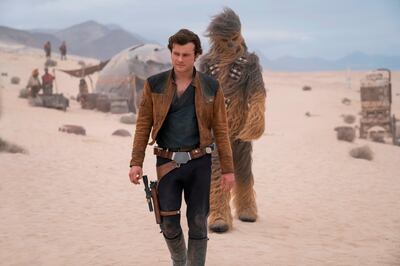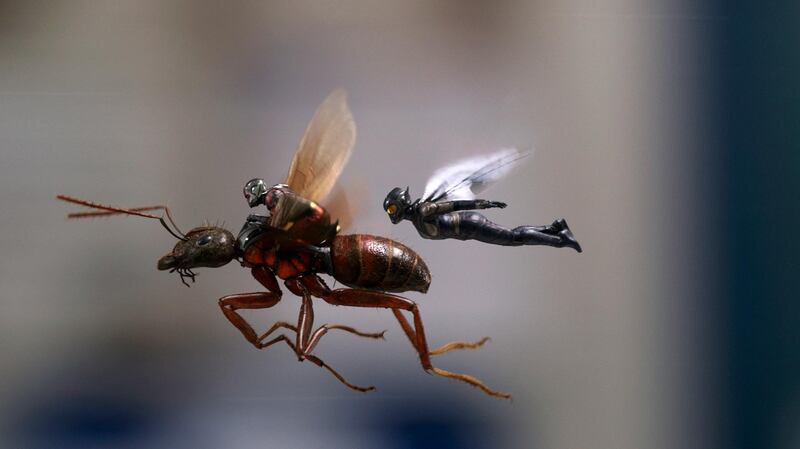Ant-Man and the Wasp, the latest instalment in the Marvel Cinematic Universe, will have put a smile on the faces of studio execs at Disney over the weekend, buzzing to a circa- $80 million (Dh293.8m) North American debut, and taking around the same again globally to give it an opening weekend around the $160m mark – South Korea led international markets for the movie with a $20m ticket spend.
While that figure is peanuts compared to the record-smashing Avengers: Infinity War, which experienced the world's highest-ever opening weekend back in April with $680m globally, Disney won't be too concerned about that. Ant-Man is, after all, in every figurative and literal sense, a much smaller film than the Avengers epics.
Budget-wise, although Disney hasn't released confirmed figures, Ant-Man and the Wasp is believed to have cost the studio around $160m to produce, compared to estimates of up to $400m for April's Infinity War and well over $200m for January's Black Panther.
With marketing budgets likely to be proportionally similar, no one at Disney would be expecting Ant-Man to equal or better Infinity War's $2 billion plus global take. What Disney will be wondering is whether it has improved on the first Ant-Man. The answer is a resounding "yes." The first instalment took a comparatively measly $57.2m in its domestic opening weekend.
The other main concern will be "how did the film fare against the competition"? There's another box ticked for Disney. Ant-Man easily sat atop the weekend's box office hill. Its nearest new release competitor, The First Purge, opened two days before Ant-Man in the States to try and cash in on the Fourth of July weekend box office, and still only managed to amass $32m in what was essentially a five-day opening weekend (that's less than half of the Ant-Man takings). The film's other closest competitors were holdovers Jurassic World: Fallen Kingdom and The Incredibles 2, both of which pulled in less than $30m over the weekend.
The movie had another notable success too: courtesy of Evangeline Lilly's The Wasp, the film is the first in the Marvel Cinematic Universe to feature a female hero in a title role. The decision to expand Lilly's character seems to have been a hit with audiences. Unusually for a superhero movie, for which audiences are traditionally heavily male-skewed at around 62 per cent, early indications are that audiences for Ant-Man were 45 per cent female. That's not quite on par with DC's Wonder Woman, which achieved audience parity back in 2017, but it's impressive nonetheless. Disney's inclusivity department will no doubt be giving themselves a pat on the back.
There's no denying that the poor little brother of the MCU franchise is performing on many levels, but how long can Marvel's magic dust last? Ant-Man and the Wasp is the third film from the MCU this year already. It has taken a step away from the epic nature of Infinity War or the welcome political subtext of Black Panther.
_______________________
Read more:
Amid public triumph, private turmoil for Marvel's Stan Lee
Marvel confirms first Muslim superhero Ms Marvel is coming to the big screen
Avengers: Infinity War sets record as fastest to surpass $1 billion
From Iron Man to Wonder Woman: The endless love affair with superhero movies
_______________________
When compared to the notions of "half of all life in the universe being wiped out at the whim of a manic warlord", or the appalling state of race relations in 21st-century America, Ant-Man and the Wasp's goofy plot of chasing a comically wicked dealer of stolen technology and knocking out the bad guys with giant Pez containers is a welcome relief. Here though, Marvel is in a sense its own worst enemy. The decision to follow up the studio's previous two movies this year with some comic relief was in every sense the right one, save for former-management at Marvel's decision to licence out many of its own key properties.
Comic relief from the dark nature of those two previous MCU movies was already provided a couple of weeks before Ant-Man and the Wasp courtesy of Ryan Reynolds in the Fox-licensed Deadpool 2, a funnier, less family-friendly, film than Ant-Man.
Then there's all the others – The Sony-owned Spider-Man (who at least has now been partly reintegrated to the MCU thanks to a rights-sharing agreement with Disney) and the Fox-owned X-Men, and that's a lot of Marvel to take in.
Disney's recent acquisition of Fox's film division will go some way to returning control of release schedules to the parent company, but with three MCU movies (Captain Marvel, an untitled Avengers film, and Spider-Man: Far from Home) due next year, on top of two X-Men movies (Dark Phoenix and The New Mutants) and multiple new Deadpool and X-Force films confirmed in the wake of Deadpool 2's success, we have a lot of Marvel to come.
So far, Marvel has managed to largely escape the curse of "franchise fatigue." Disney should stay alert, though. Its other seemingly untouchable franchise, Star Wars, just saw its first big box office disappointment.
Solo's $210m take domestically is far from smash hit territory, and in fact means the film has only just surpassed 1980's The Empire Strikes Back at the home box office, and that's without adjusting Empire for inflation 36 years later.

Rival DC is also taking stock of its own cinematic universe following the disappointment of Justice League last year.
If even much-loved characters like Batman can fall victim to the franchise fatigue syndrome, then lesser-known characters like Ant-Man and Captain Marvel are not immune.
Surely, with none of these three mega-franchises due to release another film until DC's Aquaman at Christmas, we at least have around six months to prepare ourselves for the next onslaught.
Perhaps in that time one of the major studios might like to consider releasing an original film that doesn’t involve capes, iconic spaceships or marketing tie-ins with Hasbro?





